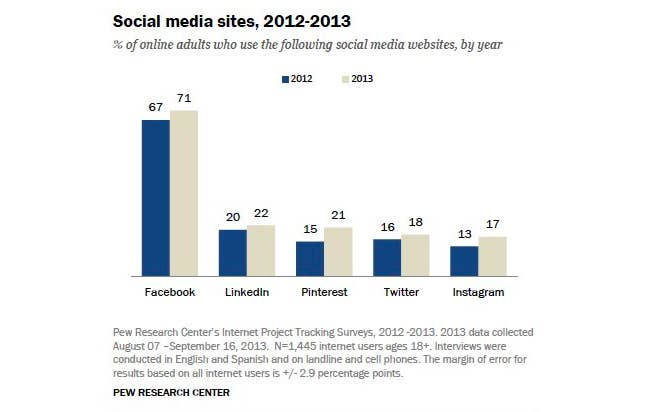
This morning, the Pew Research Center social media report revealed that 73% of online adults now use some form of social networking site. It's a large figure, and one that continues to show just how well these platforms have woven themselves into our lives. But it also reveals another, possibly more striking figure: that roughly 27% of online adults choose to live a life free of social networks. They're online but, for the most part, they're off the grid.
It's important to remember that this isn't a group composed of luddites or shut-ins but of individuals who see the social networks and, often the internet as a whole, as a set of tools rather than necessities. My parents, for example, fall into this group of 27 percenters. They're both quite comfortable and completely proficient online, but, outside of email, their experience is rarely social. They both have Twitter accounts but they're mostly dormant and generally an afterthought when it comes to their online experience. Neither one is on Facebook; they have never shown any real interest in signing up, and likely never will.
Over the holidays, when the subject of Twitter and Facebook came up, they weren't so much dismissive of the services as they were uninterested in incorporating them into their online experiences. "I don't need to tell people what I had for lunch each day and it's not like they'd care anyhow," one said of Twitter, suggesting that "it makes sense for those who want to broadcast and those in the media, but it just doesn't make sense for me."
If you dedicate a lot — maybe too much — of your time to one or any of these social networks, it's easy to feel that this line of thinking is a cop-out, or simply an uninformed opinion. But for those who never had occasion to join Facebook in its early years — back before photo galleries and News Feed, when the site catered almost exclusively to college and high school students — and for those who view the internet and its sites as a series of utilities designed to make things like bill paying, fact-finding, and department-store shopping easier, Facebook and most social networks feel a lot like nonessential tools. It's a divide that's not so much about utility vs. enjoyment, but about identity vs. anonymity, and effort vs. payoff. A tool that's attached to one's real name and that requires constant attention runs the risk of not being a tool at all. It can, for a very casual user, transform into a burden.
For those who got in early, a service like Facebook is more than adequate at delivering news and photos and updates from friends and family. But joining now and building a network is a fairly daunting prospect with a less-than-obvious payoff. You don't have to look much further than the site's intricate sign-up process to see how joining Facebook might feel both invasive and unnecessary. Then there's Twitter, with its unfamiliar language, insular culture, and messy onboarding process, that encourages the bulk following of celebrities and brands, rather than friends and family. Go further out to Instagram and you're dealing with a mostly younger user base and a quirky user experience that can make it difficult to find friends, or, really, anything at all.
While the 27% figure is sure to go down — it fell a few percent over the last year — it would be unwise to expect it to shrink drastically in the coming year, or to assume that online/off-grid life is going to disappear. The main reason the 27 percenters abstain from social networks isn't a fear of the services or a lack of understanding of how to log on. It's not a demographic that's inherently antisocial, either. It's a demographic that gets real satisfaction using banking apps to check statements and keep track of bills and a group that is happy to find a promotional email directing them to an online sale. It's a group that can relate the wonder of Google's mission statement — "to organize the world's information" — but that has little interest in Facebook's. It's a group that uses the internet as a tool kit and doesn't quite understand the need for or allure of a cascading social feed. Generally speaking, it's a group that has a narrower, more focused idea of what the internet is: an internet that's less an extension and reflection of their lives and more of a supplement to the ones they already have.
